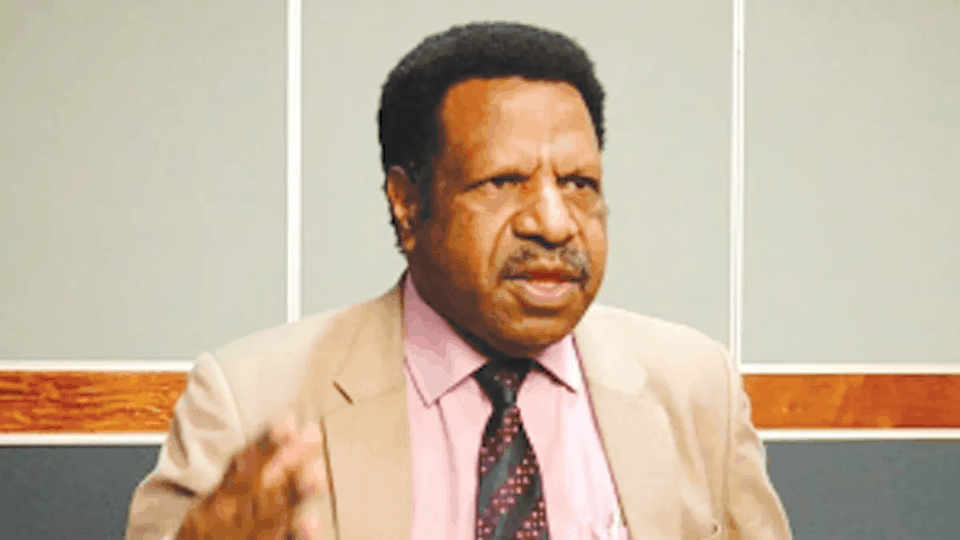Education Secretary Dr. Uke Kombra has challenged all Provincial Education Advisors (PEAs) to increase efforts to ensure all children in their respective provinces receive a high-quality, universal education for 13 years.
He stated this during a recent conference, where he raised two issues that the attendees were to consider and devise a plan to overcome.
The first is the obstacle of the delay in achieving universal access to education – ensuring a child completes a full 13-years of school.
He said this means ensuring all 6-year-olds in every province who are enrolled in school, do not drop out between Prep and Grade 12; and also the extent to which each province is prepared to administer the scheduled exit exams for Grade 8 in 2025 and Grade 10 in 2027.
Dr Kombra said the second issue is on the quality of the national education quality, prompting participants to acknowledge how much students struggle in literacy and numerical skills, how much support they receive and accessibility to resources like textbooks, technology, and qualified teachers; and whether they are well-mannered with virtues like respect, humility, honesty, and love.
He urged all the PEAs and their planners to consider narrowing the gap in academic achievement between different groups of students, schools, districts and provinces.
Dr. Kombra said PEAs and their planners need to identify the issues and find workable solutions.
“We have to acknowledge that PNG’s greatest asset is its people, not its natural riches, physical location, or both.”
“According to compelling research, investing K98 in a child results in a K512 return on a sustainable improvement in livelihoods, including higher life expectancy, fewer health problems, and a decline in teen pregnancy and crime.”
He further said there must be collaborative effort to leave no child behind in the quest to provide quality education for all.
Dr. Kombra also provided primary objectives for the next five years, such as ensuring all 9-year-olds become proficient readers; reducing the poverty of learning; and raising learning.
Other primary goals he raised included focusing on preparing children to be ready to learn by:
• Scaling up Early Childhood education – Starting 2025;
• Trialing different implementation models for accessible and remote areas;
• Development of blended curriculum including Accelerated Christian Education (ACE) from ECE to Lower Primary;
• Making Phonics mandatory so that every student reads in 7 months;
• (Preparatory – P) Curriculum prepares every child for grade 1;
• All students have admission numbers and tracked; and that
• All students have a child investment account financial literacy and retention strategy.
He said the other focus area is in preparing teachers to be ready to teach, which entails:
• Restarting annual ongoing teacher professional development;
• Investing in well-designed modules focused on content and pedagogy with coaching and mentorship throughout the year;
• Providing necessary teaching and learning resources;
• Adapting a phased approach that will gradually reach all provinces across all sub-sectors;
• The conversion of 18,000 teachers from elementary teachers to diploma level (DHERST) and Diplomas to Bachelor level; and
• Training ECE teachers (DHERST).
The third focus Area 3 is to ensure School environments are ready for teachers and children, and this includes:
• Investments in infrastructure;
• Refurbishing classrooms/new classrooms for 2-1-6-6;
• Providing gender separated toilet, teacher housing, SBC Teaching and Learning Materials, textbooks, reading Books, syllabus and Teacher Guides, as well as Financial Literacy for all students, ensuring a 1:1 student textbook ratio in primary schools;
• Providing Digital Transformation to enhance teaching and learning, and Internet/Wifi and digital libraries for all schools; eCopy textbooks in secondary schools; and
• Providing FODE and School of Excellence infrastructure
Another focus area is the Flexible and relevant Education pathways, which should see FODE expansion and excellence to attain 100% retention – universal secondary education; and School of Excellence to promote the gifted students for 21st Century jobs; and technical secondary schools prioritising vocational specialisation.
Dr Kombra added the should be on modernising the management of the sector, and this means growing investment in Inspections system for quality assurance; integrating data on teachers, schools, and students under one unified ministry-level database architecture; supporting the introduction of national assessments and aptitude tests, and hearing and sight tests at younger grades; and ensuring all teachers have a National Teacher Smart Identification Card
“PNG has the global and local knowledge on what to do and how.”
“One of the actions we need to take is to increase spending on cost-effective interventions that have been shown to improve student learning and immediately commence prioritising foundation education.”

